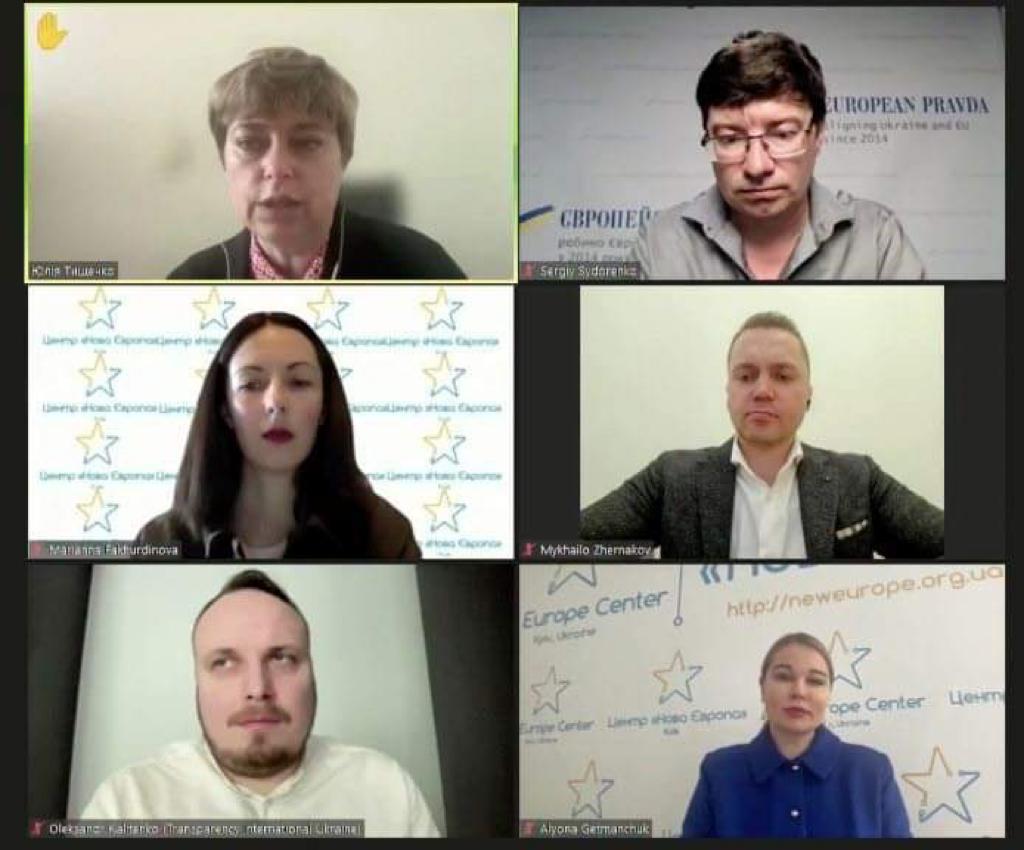
On May 4, the “New Europe” Center in partnership with a number of specialized think-tanks and NGO’s broadcasted online from Kyiv and presented an independent monitoring of Ukraine’s implementation of EU recommendations regarding its membership.
We remind you that in June 2022 Ukraine received EU candidate status with a number of recommendations to be fulfilled for further promotion to membership. In June of this year, the European Commission will present an interim verbal conclusion on Ukraine’s progress in the implementation of seven euro reforms. In June, a preliminary EU summit’s decision on the opening of negotiations on Ukraine’s EU membership is expected.
Alyona Getmanchuk, Director of the New Europe Center
“I hope that Candidate Check-4 is one of the last monitoring reviews of EU seven recommendations implementation. First, in June 2023, we expect a verbal conclusion of the European Commission and then the preliminary decision of the EU summit on the possibility of opening negotiations based on a positive assessment by the European Commission. In October the EC report will be issued as it is is traditionally set up for all candidate countries. And later in December, at another EU summit, a political decision about the very opening of entry negotiations is expected. It must be understood, and this has been clearly signaled about in some European capitals, that the implementation of these seven recommendations does not guarantee the automatic opening of entry negotiations. However, it is unlikely that the EU will dare to deny Ukraine the start of the opening negotiation process if the recommendations are implemented and the European Commission’s report in October is generally positive”.
According to the latest data, Ukraine totally scored a little bit more on all seven indicators than assessed by the previous monitoring in February this year (it became 6.8; it was 6.5). The Media Legislation scored the most points (9). The changes in the National Minorities Legislation scored the same 8 points.
Yuliya Tyshchenko, the Head of the Program for the Support of Democratic Transformations, the National Platform for Stability and Cohesion
“Meeting the requirements of the European Commission regarding reforms in the national minorities legislation is not only the adoption of appropriate legal acts, but also it is the development of implementation mechanisms for such regulations. This reform is currently in the process of implementation. But at the same time, implementation needs to be clearly established. It includes the adoption of concepts, programs and by-laws as well as it requires clear communication from the authorities. Globally, this legislation is not only about national minorities, but also about our society as a whole, when separate components form an entity and common civil identity based on respect for diversity”.
Anti-corruption: SAP (Specialized Anti-corruption Prosecution) and NABU (National Anti-Corruption Bureau of Ukraine) – 8 points (was 7).
Oleksandr Kalitenko, legal advisor of Transparency International Ukraine
“Regarding anti-corruption reforms, we have formal implementation of two parts of the recommendation out of three. During this evaluation period, in addition to the previously appointed head of the Specialized Anti-Corruption Prosecutor’s Office, another new appointment was added: the director of NABU was elected. The experts have certain comments as to the selection procedure itself, and questions remain unanswered as to why this particular winner was chosen, but his activities will already be out of the initial recommendation scope because formally the head of NABU was appointed. Regarding the third part of the recommendation, NABU, SAP and HQCJ keep a high level of activity in cases related to high-rank corruption, which corresponds to the direct wording of this recommendation. However, the authorities still have to perform a number of actions such as restoring e-declaration in previous volumes”.
Money Laundering fight – no progress. Still those 6 points in this issue, whereas the team of experts decided not to evaluate the anti-oligarchic reform at all.
Serhiy Sydorenko, an editor of “European Pravda”
“Regarding anti-oligarchic reform, we faced a unique situation when Ukraine has a will to fulfill the European Union criteria for starting membership negotiations, but the European side itself prevents us from doing so. The fact is that according to the criterion that the EU put forward almost a year ago, the Law on Deoligarchization must be adopted in accordance with the recommendations of the Venice Commission. But since then the opinion of the Venice Commission on this matter is still not available, and it is doubtful that it will appear this year. This means that Ukraine can fail the EU criteria through no fault of its own. We, as a coalition of experts, consider the situation unacceptable and insist that the European Union should either clarify this criterion for Ukraine, or decide not to take it into account when making decision on the start of negotiations”.
The continuation of the judicial reform was granted a point more than before, 8 against 7. The reform of the Constitutional Court has been completely failed. So, the experts gave this issue its permanent 2 points out of 10 possible.
Mykhailo Zhernakov, Co-founder and Chairman of the Board of DEJURE Foundation
“We have positive changes in the issue of reforming the High Council of Justice (HCJ) and the High Qualification Commission of Judges of Ukraine (HQCJ). However, we have to mention that the legislation of Ukraine gets worse for the implementation of the Constitutional Court reform. Unfortunately, we have not succeeded in this case. And even rolled back, so our score decreased from 3 to 2 out of 10. Recently, a law was passed that not only disregards the recommendations of the Venice Commission, but directly contradicts them. The Venice Commission officially informed about it in a letter. Moreover, bill 9225, which makes the situation even worse compared to the current legislation, has now been registered to supposedly correct the situation. This can be perceived as an attempt to establish control over the Constitutional Court. And this will not help us develop in any way. We will not see EU membership unless we have the rule of law. Therefore, the evaluation of the government’s actions is unsatisfactory in terms of the implementation of the recommendations of the Venice Commission”.
Summary of the implementation of 7 reforms by the New Europe Center:
Over the course of more than 10 months, Ukraine has demonstrated significant progress in implementing 7 EU reforms, with an average expert score of 6.8 out of 10.
Reforms #2 and #3 are nearing completion: 17 out of 21 members of the High Council of Justice of Ukraine (HCJ) have been appointed, and the latter have already begun interviews with 32 finalists for positions in the High Qualification Commission of Judges of Ukraine (HQCJ), two of the most important judicial bodies in Ukraine. In the field of anti-corruption, heads of the Specialized Anti-corruption Prosecution (SAP) and the National Anti-Corruption Bureau (NABU) have been appointed (the latter still needs to demonstrate competence and political independence in his work). NABU, SAP, and the High Anti-Corruption Court of Ukraine (HACC) are also showing high activity in cases of top-level corruption.
Work is continuing on finalizing reforms #6 and #7: the Verkhovna Rada of Ukraine (VRU) adopted, in the first reading, the law on advertising that will complete the unification of Ukrainian media legislation with the EU Directive on Audiovisual Media Services. The development of bylaws to implement the law on national minorities is also ongoing.
At the same time, there is some stagnation in the implementation of recommendation #4: in September, the VRU adopted a series of legislative acts in the field of money laundering that bring Ukraine closer to FATF standards, but there has been no progress in implementing this part of the recommendation since then. Also, since the beginning of January 2023, approval of the Comprehensive Strategic Plan for Reforming Ukraine’s Law Enforcement Sector by the Office of the President is still awaited.
The implementation of the anti-oligarch reform has been effectively frozen since Ukraine was granted candidate status in June 2022, due to the absence of a Venice Commission opinion on the relevant law. As a result, experts do not evaluate the implementation of this recommendation.
The only truly problematic sector remains the reform of the Constitutional Court of Ukraine. The mechanism for selecting judges to the Constitutional Court provided by the new law of December 13, 2022, does not comply with the recommendations of the European Commission; and the bill No. 9225 registered on April 20 further increases the risk of political control over the Constitutional Court. At the same time, experts from the coalition are calling on EU member states to pay attention to the problem of inconsistency in the actions of the European Commission, which has unofficially changed its position on the number of members of the Expert Advisory Group (6 instead of 7).
Serhiy Sydorenko, an editor of “European Pravda”: “In the middle of last year, we were extremely skeptical as to the government’s forecasts about the reforms deadlines – at that time, Kyiv promised to complete everything by the end of 2022, but we deemed this impossible and time proved that our assessment was correct. And as of now, our estimates and the government’s ones coincide. We consider it true to life to fulfill all 7 criteria to the level of 8-10 points by this autumn, which will give Ukraine the right to insist on the start of the EU membership negotiations and to claim that the Ukrainian authorities have completed their homework”.
Full version of analytical report is here – http://neweurope.org.ua/en/analytics/kandydat-check-4-de-ukrayina-perebuvaye-u-vykonanni-7-rekomendatsij-yes/
The recorded broadcast on Youtube- https://youtu.be/PEq0OVTYqbk







